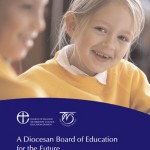 Archbishop Justin Welby asserted the centrality of schools to the Church's mission to the nation as he hosted a seminar called Church of England: Education and our Future at which the Secretary of State, Michael Gove, also spoke and affirmed the part Church Schools have to play.
Archbishop Justin Welby asserted the centrality of schools to the Church's mission to the nation as he hosted a seminar called Church of England: Education and our Future at which the Secretary of State, Michael Gove, also spoke and affirmed the part Church Schools have to play.Ann Holt OBE and Bishop Mike joined Diocesan Bishops and Chairs of Diocesan Boards of Education (DBEs) from every diocese at the specially convened meeting at Lambeth Palace.
They discussed the future of the Church's role, nationally and locally, in providing a distinctive and significant contribution to the educational landscape and explored how Church of England schools can be a key part of the Church's mission and contribution to the good of society.
Standards
The Rt Hon Michael Gove, Minister for Education, who spent time in dialogue with the Archbishop, said:
We would not have so many great state schools in this country without the Church of England. I want the Church to recover the spirit which infused its educational mission in Victorian times and support more new schools especially academies and free schools to bring educational excellence to the nations poorest children.
A guide and route-map for how this may work out was released, titledA DBEfor the Future. This gives ten hallmarks for a successful DBE. The first of these is an emphasis on standards, challenging dioceses to ensure at least 90% of their Church schools are classified Good or Outstanding by Ofsted inspections.
Christian character
Archbishop Justin added that, aside from achieving higher than average standards, Church schools legal obligation to advocate Christian values was a key part of transforming every part of our society through mission:
It is about setting a framework for children as they learn, which enables them to be confident when faced with the vast challenges that our rapidly changing culture brings to us.
Mission to all schools
It was also announced by the Rt Rev John Pritchard, Bishop of Oxford, who is the Chair of the national Board of Education, that it is now legally possible for community schools to join a dioceses multi-academy trust (MAT) without having to become a Church school. Far from the Church taking over state schools, as some headlines suggested, this development allows a state school to benefit from the care and economies of scale available to members of a MAT.
RE
After well-grounded fears of the marginalisation of religious education by the current Government, Bishop John said of Mr Goves talk with the Archbishop:
I was also pleased to hear his public commitment to re-opening the conversation with the Churches on the future of RE and his recognition of its importance within the curriculum."
RE is not only a key area for teaching children about Christian values and belief but also a unique subject in the way it challenges and equips children of any faith or none to think critically about the world and choices they encounter.
The local picture
Bishop Mike welcomed the developments, saying: For many children, school is where they may first encounter the Christian message, either through teaching or through the ethos which pervades the school. In this Diocese we are working towards making the support of schools and staff, and the nurturing of the children in their care, a key focus of energy.
Canon Ann Holt, the Chair of the Diocesan Board of Education, says: The seminar and accompanying documents provide an excellent opportunity to review the effectiveness of the work of DBEs. I was delighted to note that much of our work in the last year has been around the key issues raised. We have clear plans through the autumn of 2013 to work with the new DBE members and the staff team to progress this work further. Our annual Headteachers' Conference on 18 October is very timely.
Some notes:
Our own MAT is called Bristol Church Academies Trust (BCAT). It currently oversees one Church school Fishponds CE Academy and will likely sponsor more schools in the future. A grant was recently made by the Department for Education to BCAT for expanding its capacity.
82% of the Dioceses 68 Church schools achieved a Good or Outstanding outcome at their last Ofsted inspection. Several of the schools judged to be requiring improvement are well on their way to entering these higher categories, bringing Bristol DBE closer to the newly set target of 90%.
Another of the new hallmarks for a highly performing DBE was that dioceses ensure their education departments are well resourced. A recent strategy planning exercise at the Diocesan Office showed that area deans and other strategic leaders considered that education and schools ought to be a major focus for the Diocese.
A further aim for DBEs to work towards is for Foundation governors of schools (nominated by PCCs) and ministers to be available to engage in working with schools. Many incumbents and parishioners are already governors of both Church and community schools but individuals of a good calibre are increasingly needed by schools to sit on governing bodies to act as the driving force for school improvement.